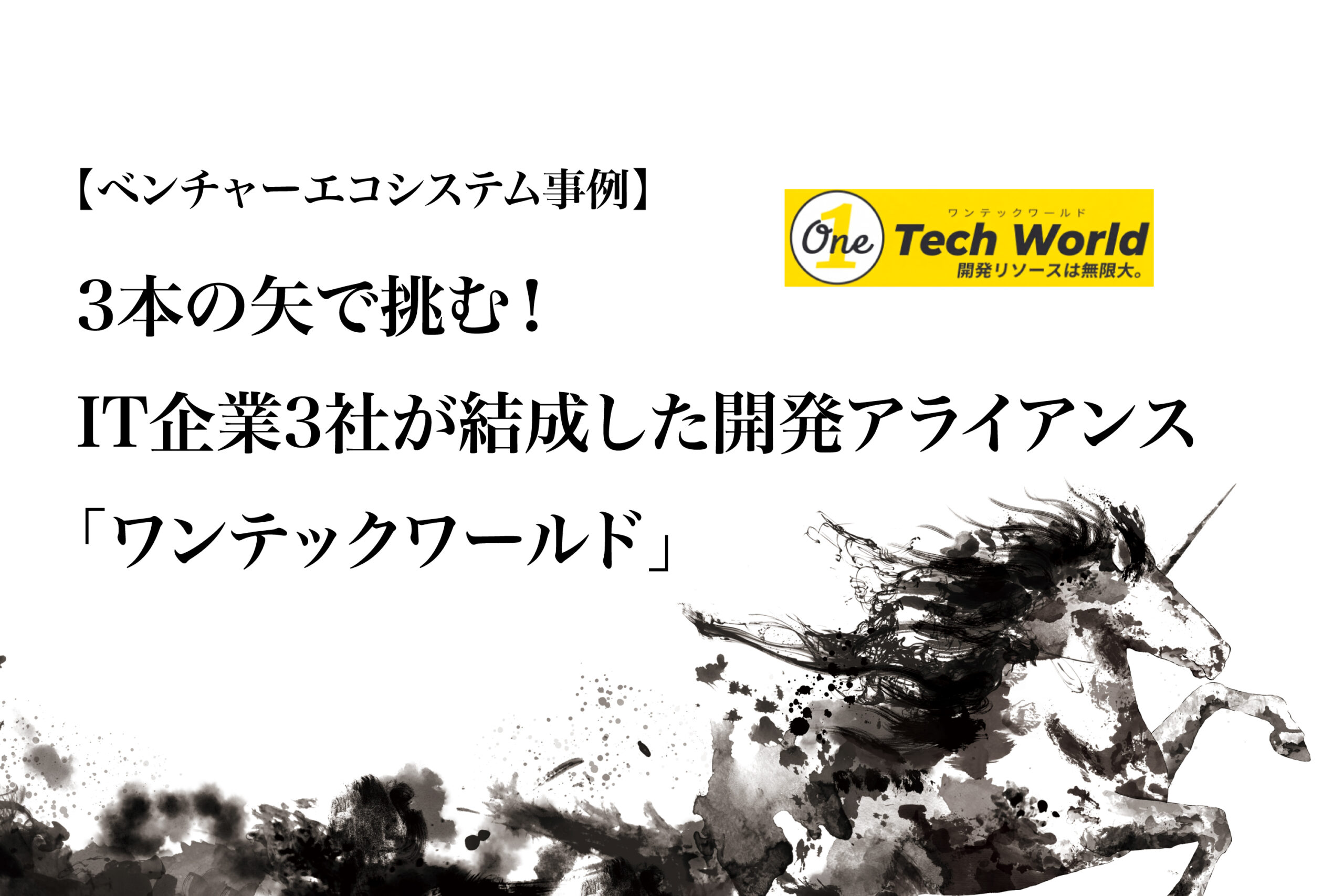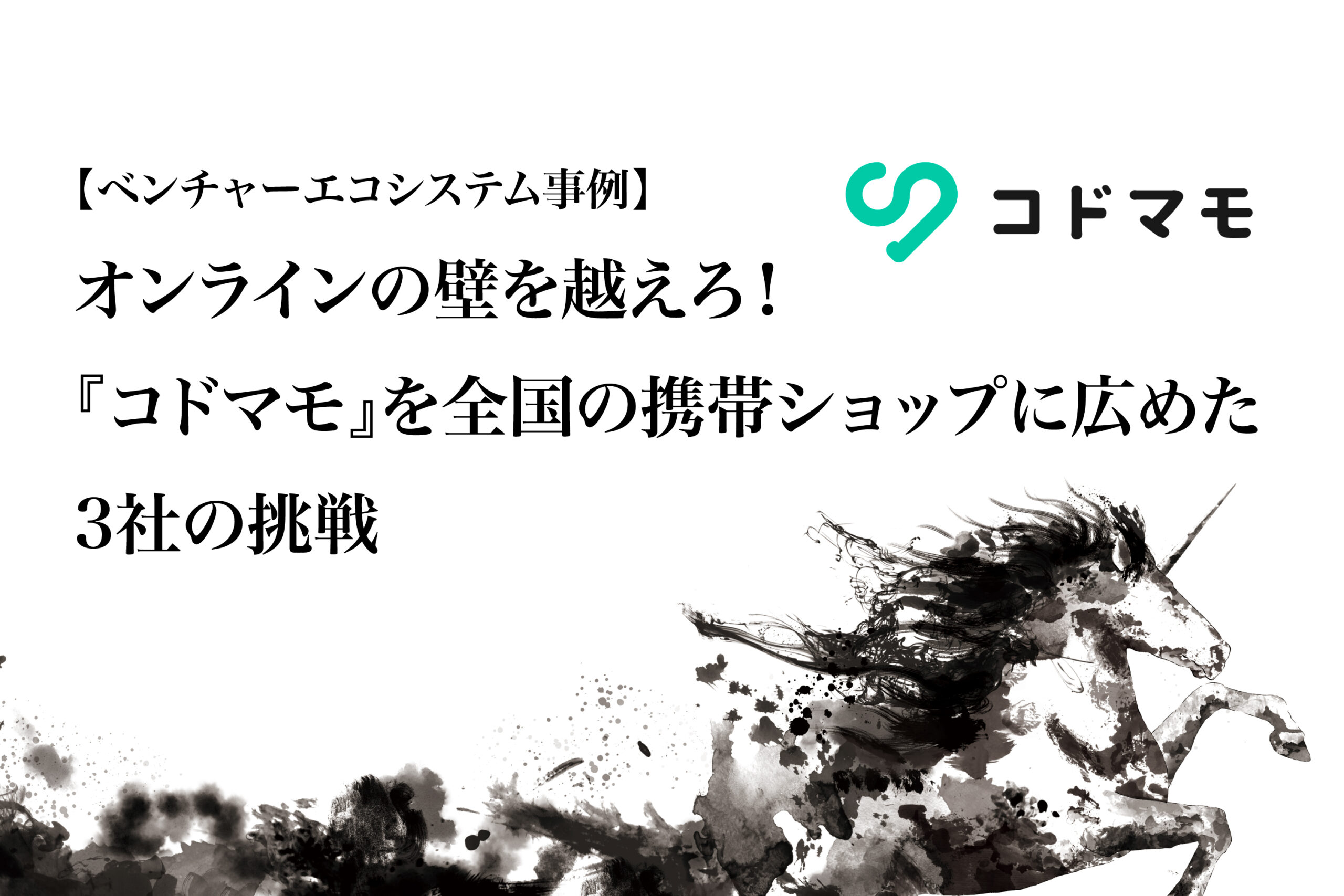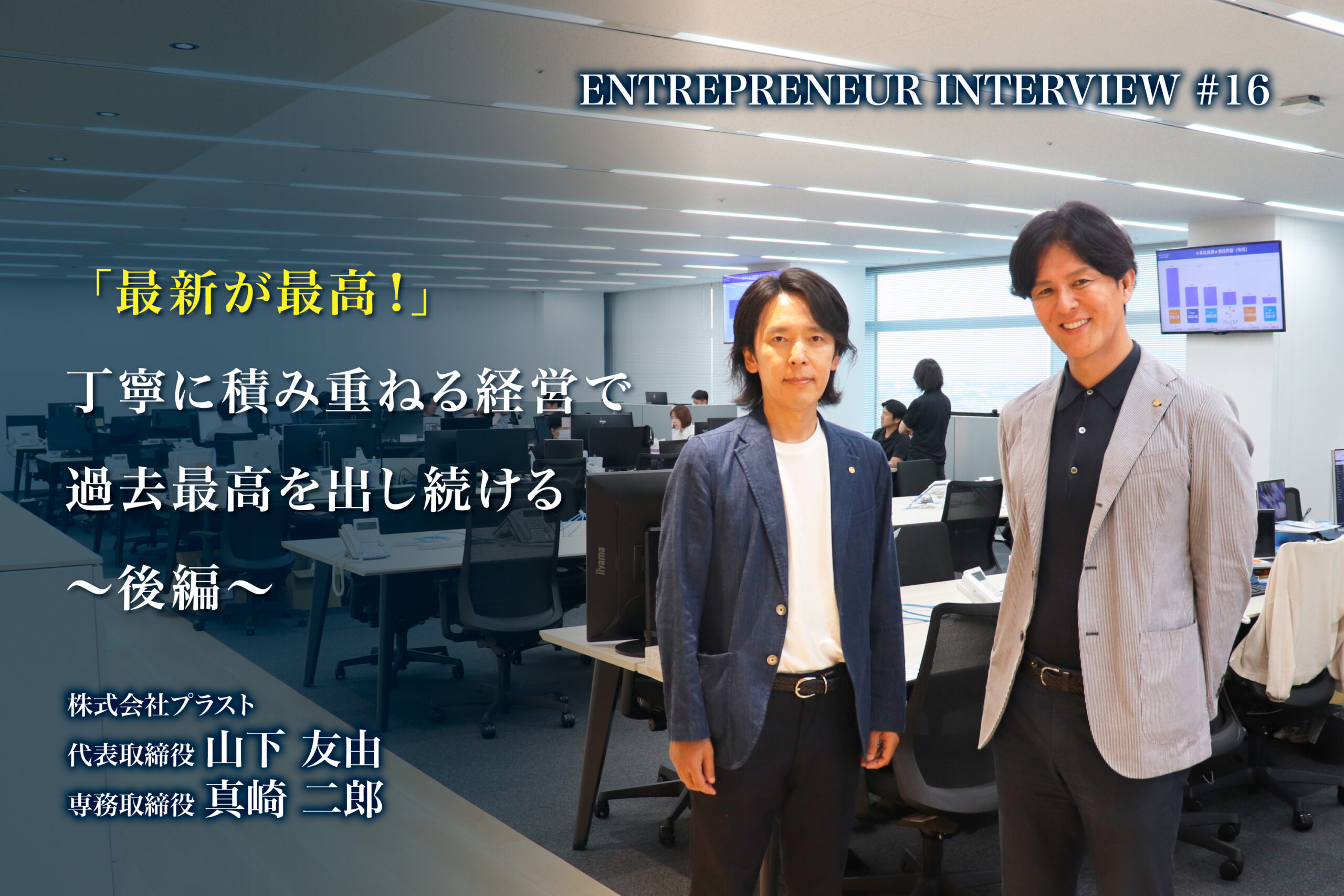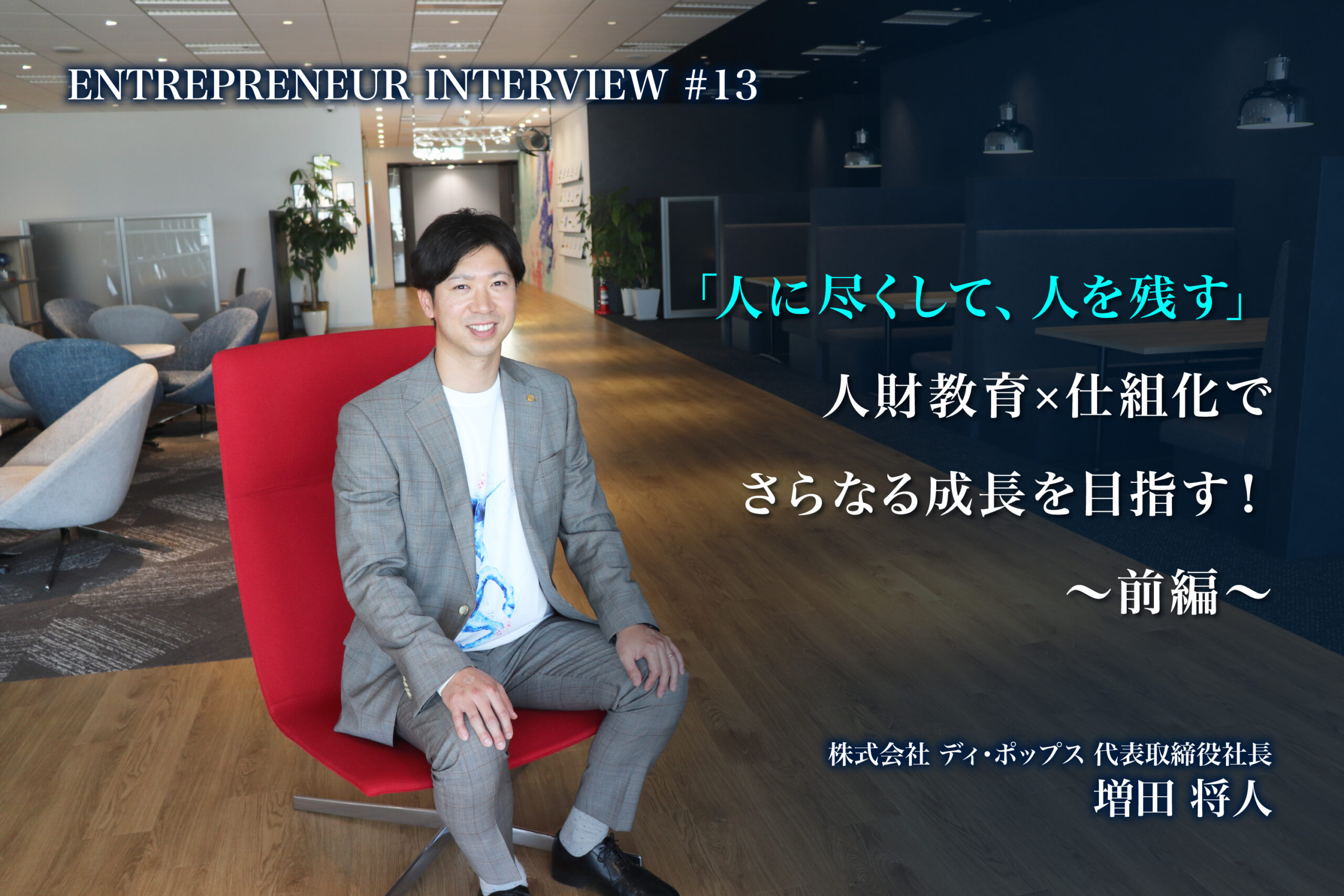
“Serve people and cultivate talent”
Aim for further growth through developing human resources and systematization!
D-POPS GROUP has 23 group companies that we call partners (at the time of publication).
For this article, we interviewed Shoto Masuda, the current CEO of D-POPS Corp., the founding business of D-POPS GROUP.
(This interview was conducted in March 2025.)
◆Background of Initial Employment
Sugihara:
President Masuda, thank you for agreeing to this interview. You joined D-POPS right after graduating in April 2012, correct? Could you tell us how you came to join the company?
Masuda:
During my university days, I went to Beijing to study abroad for four and a half years. I didn't really know how job hunting worked. So, during the summer break after the first semester of my senior year, July and August, I used those two months to start my job search.
I think I actually interviewed with about five companies. I tried for major trading companies and such, but it didn’t work out. In the end, the companies that offered me a job were D-POPS and a large company listed in the First Section of the Tokyo Stock Exchange.
I received that large company’s offer first, but my feelings changed as I went through the interviews with D-POPS. When I interviewed at D-POPS, the company atmosphere seemed bright. I could really envision its future development.
Also, after speaking directly with Mr. Goto, I had a strong intuition that joining this company would change my life, or that I’d encounter a huge positive opportunity for my life. So, midway through the process, my mindset shifted to “I want to join this company”, and I was hoping they wouldn't reject me, ha ha.
By the way, my final interview with Mr. Goto lasted about three hours.
Sugihara:
How big was D-POPS at that time?
Masuda:
I think the company was probably around its 15th fiscal year.
Sales hadn't reached 10 billion yen yet…I think they were around 7 to 8 billion yen.
At that time, the strong rallying cry throughout the company was something like, "Let's reach 10 billion yen in sales!"
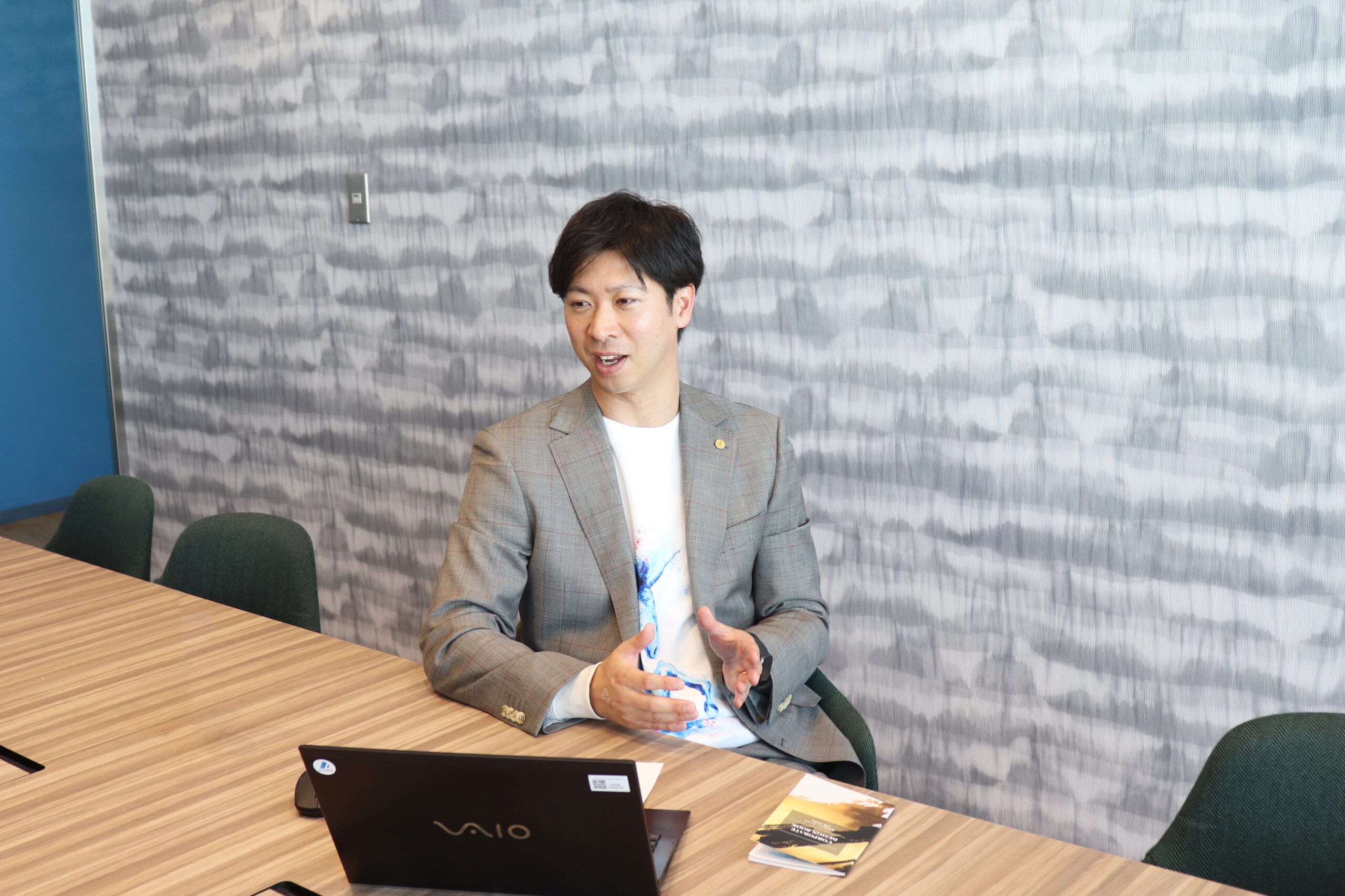
◆Getting Appointed as CEO
Sugihara:
D-POPS is the founding business established in 1998 by President Goto, founder and CEO of D-POPS GROUP. However, you became president of D-POPS in March 2024, even though you’re only in your mid-30s. I hear you were promoted at an exceptional pace over these 12 years, becoming a general manager, executive officer, and so on. Looking back, what are your thoughts?
Masuda:
Well, I certainly think “luck and timing” played a role. In addition, the fact that the company was on the verge of a major transformation was a significant external factor, I believe.
You see, about a year after I joined, D-POPS and Good Crew had already reached 10 billion yen in sales. From there, when President Goto envisioned further growth strategies, he shifted from D-POPS growing alone to gradually developing a group structure. At that time, President Fujita, who was my superior, left to establish Advancer, and then President Hosaka left to establish STAR CAREER.
When my superiors became independent, or “graduated” in a sense—and I think this involves both external and internal factors—there was a period when the company’s performance declined, and the organization underwent a major change.
I was in my third year then, still only a store manager, but at that point, what was originally a large pyramidal organization was flattened, and almost everyone became approximately the same level, directly under the president.
A manager in their third year is considered young, right? Even at that level, we were given a lot of discretion. Meetings that were previously only attended by the top management became intense morning discussions involving about 20 selected individuals, which provided a great learning opportunity. It became a chance for members in their third year, like myself, to seize opportunities. We took on challenges one after another. Rather than feeling like assignments were given to us from above, it felt more like “We’re going to seize these ourselves.”
It was lucky that we were presented with equal opportunities, but I believe the proactiveness to seize those chances was also incredibly important.
Sugihara:
As you seized opportunities and moved up the ranks, what was the area where you put in the most significant effort?
Masuda:
I worked the hardest at constantly reaching out to my superiors. It was also around the time Dr. Semmoto joined, and I made sure to sit next to and learn from President Goto and other surrounding business leaders and advisors—people who were significantly above me—whenever there were opportunities for dinners or study sessions. Not many people want to do that. But I knew that if I dove fully into it, there would always be something to gain.
And in terms of work, from the company’s perspective, they usually ask people to take charge of areas with poor performance, right? I proactively took on such positions, driven by the desire for those areas to improve as quickly as possible. Thus, when performance picked up in those areas, I gained attention. And since they were challenging positions to begin with, even if results didn’t come immediately, I’d get words of encouragement like, “You’re doing great!” No matter what kind of challenge came my way, I made a conscious effort to tackle it head-on.
Sugihara:
How did President Goto approach you about becoming CEO of his company? And how did you feel at that time?
Masuda:
This part is a bit ambiguous. It wasn’t like President Goto called me in and said, “Okay, you’re the new boss now.”
The truth is, although President Goto was still the CEO of D-POPS structurally, he had already been giving his undivided attention to managing D-POPS GROUP for several years prior to this point, and the management of D-POPS itself was basically delegated to the other top leaders.
Within that context, the performance and organization of D-POPS progressively worsened. There was a very uncertain period. At that time, I was mainly in charge as the General Manager of Sales, and as I became an executive officer, and then a managing director and senior managing director, the company just wasn’t improving. I felt it was rapidly deteriorating, and I was struggling with the inability to see a clear path to recovery.
President Goto and I had dinner opportunities about twice a year, just the two of us, and it was during one of those times that I asked him bluntly, “Please let me be president.”
I had already decided within myself that we had no choice but to change. At that point, if President Goto were to return to operating D-POPS, it wouldn’t have been effective for all of D-POPS GROUP. So, I braced myself and thought, “I just have to do it.”
Sugihara:
From your perspective, were there multiple candidates for CEO at the time, or did you believe you were the only one?
Masuda:
The latter. I believed I was the only one. Perhaps there were others who thought differently, but I considered myself the only real possible successor.
Sugihara:
How many years ago did you start working with the awareness that you would be the president’s successor?
Masuda:
I’d say it was around when I turned 30 years old. At that time, I had become an executive officer, but I was only overseeing the Sales Division, so I wasn’t really looking at the company as a whole. However, given that President Goto was focusing on managing D-POPS GROUP, I definitely started to feel that I needed to take responsibility.
From there, I started learning various things. These included encounters arranged by Dr. Semmoto, meeting people through President Goto, and even joining communities of business executives in my late 20s. The encouragement and stimulation from those around me was significant.
At first, I wasn’t taken seriously at all because I lacked sufficient skill, but I somehow managed to hang in there. Over the past few years, I’ve gradually expanded my network, and I feel like I’m finally starting to see the fruits of all of my hard work and effort.
◆Business Overview
Sugihara:
Considering your long period of getting to where you are now, you’ve become quite the veteran. It’s been a year since you officially became the CEO of D-POPS. Could you give us a brief overview of D-POPS as a company and its current business operations?
Masuda:
D-POPS is now in its 27th fiscal year, and the telecommunications agent business, which was pioneered by our founder, remains our main focus today.
We carry out our multi-brand store business via two lines. First, we operate under our own independent brand name, “Smartphone Consultation Desk TOP1”. These are telecommunications stores that carry all the major products and services from various manufacturers and Japanese mobile carriers, in addition to our own branded products, such as security services and insurance. Along with all of these offerings, we provide comprehensive consulting, retail sales, and after-sales support to our end-users. We currently operate over 30 stores, primarily in the Kanto region.
The second line of store business is through specialty stores. As a telecommunications agency, we operate shops for the following major Japanese carriers: NTT’s docomo, KDDI’s au and UQ, and Rakuten Mobile.
Furthermore, we’re involved in media operations, developing our own specialized telecommunications media called “PhonCierge”. And in PlusPass, a child company headed by President Hirai, who helped lead D-POPS alongside me, we operate a web media called “Smappy” which specializes in low-cost SIMs and smartphones.
So, overall, we operate a telecommunications-focused platform that combines both real-world and online services, along with service businesses that support users.
Sugihara:
I believe there have been a lot of changes within telecommunications recently, especially in shop operations. What are these current industry trends?
Masuda:
There are various changes every year. Not just because of telecom carriers, but also because of Japan’s Ministry of Internal Affairs and Communications and other reasons. I think the biggest factor is the continuous alteration of various laws. However, D-POPS has been able to survive for over 20 years amidst all this because we’ve always really adapted to these changes.
◆What I Changed and Didn’t Change Upon Becoming President
Sugihara:
These past 20 years have been hectic, haven’t they? It’s been a year since you officially became CEO, in both name and reality. Can you tell us what significant changes you’ve made and what you’ve kept the same during this period?
Masuda:
This past year has truly been hectic and has flown by. Even before it was decided whether I’d become CEO, I had already made one firm decision. What’s truly great about D-POPS is how deeply our philosophy, vision, and human resource development were instilled as the company’s foundation by our founder, President Goto. I myself was educated through this, and it’s precisely why we’ve been able to survive. I felt that our approach to customers, employees, staff, and ultimately, society, has an excellent foundation, and all we needed to do is further refine it.
Additionally, for several years, when President Goto resolved to focus solely on group management, the company was essentially without a commander. This led to a negative cycle where the upper management was adrift, mid-level employees kept leaving, and young recruits would join and then quickly depart. So, I knew we had to thoroughly rebuild from the ground up.
Instead of just aiming to reduce the turnover rate in the short term, my first change was to create an environment where work is fulfilling and where both individuals and the organization can grow. To achieve this, I decided to gather all employees in person once a month for a dialogue. Partly due to the COVID-19 pandemic, but more so because our company has over 50 locations, opportunities for everyone to gather in person were limited to just a few times a year. While we do a lot of online communication now, I felt a strong sense of unease that it had become the primary mode of interaction. D-POPS has so many great qualities that I felt it was essential to convey them properly. Also, I wasn’t confident that I was adequately educating our people myself.
So, I made this decision for myself around October 2023 (my appointment to the CEO position was in March 2024): to gather all our employees in person once a month.
Sugihara:
That’s quite an undertaking, isn’t it?
Masuda:
Yes, it is. Once a month, we’ll spend the entire day together, talking about our philosophy and vision at least—and even if that’s all we talk about for the day, that’s fine. I made that decision around October, prepared extensively, and then gradually rolled it out starting around February 2024. This led to our monthly all-employee group training sessions. The purpose of these sessions is, first, for employees to have proper in-person dialogue. Then, based on the theme of the day, such as how to integrate one’s personal philosophy with the company’s, we deepen our discussions.
After all, work is a part of life. If it’s not engaging, or if it deviates too much from one’s personal values, there’s no reason to remain a part of the community. So, through in-person dialogue, we design an exciting future together. And since the timing for this coincided with my appointment as CEO, I decided to deliver these messages myself, rather than entrusting them to an external lecturer. Before starting these training sessions, I had been running “Masuda School” for about three years. That was for volunteers, not all employees, but it was in person, so I stopped that and shifted to involving all employees.
In addition to those changes, we also renewed our company logo and website.
Sugihara:
That’s wonderful. It takes courage to halt a full day’s operations to make something like that happen. Is there anything you chose not to change?
Masuda:
I didn’t change D-POPS’s historic “Creed”. While I’ve changed many things since taking office, those guidelines teach us what’s important as human beings, so for now, I intend to keep them as they are.
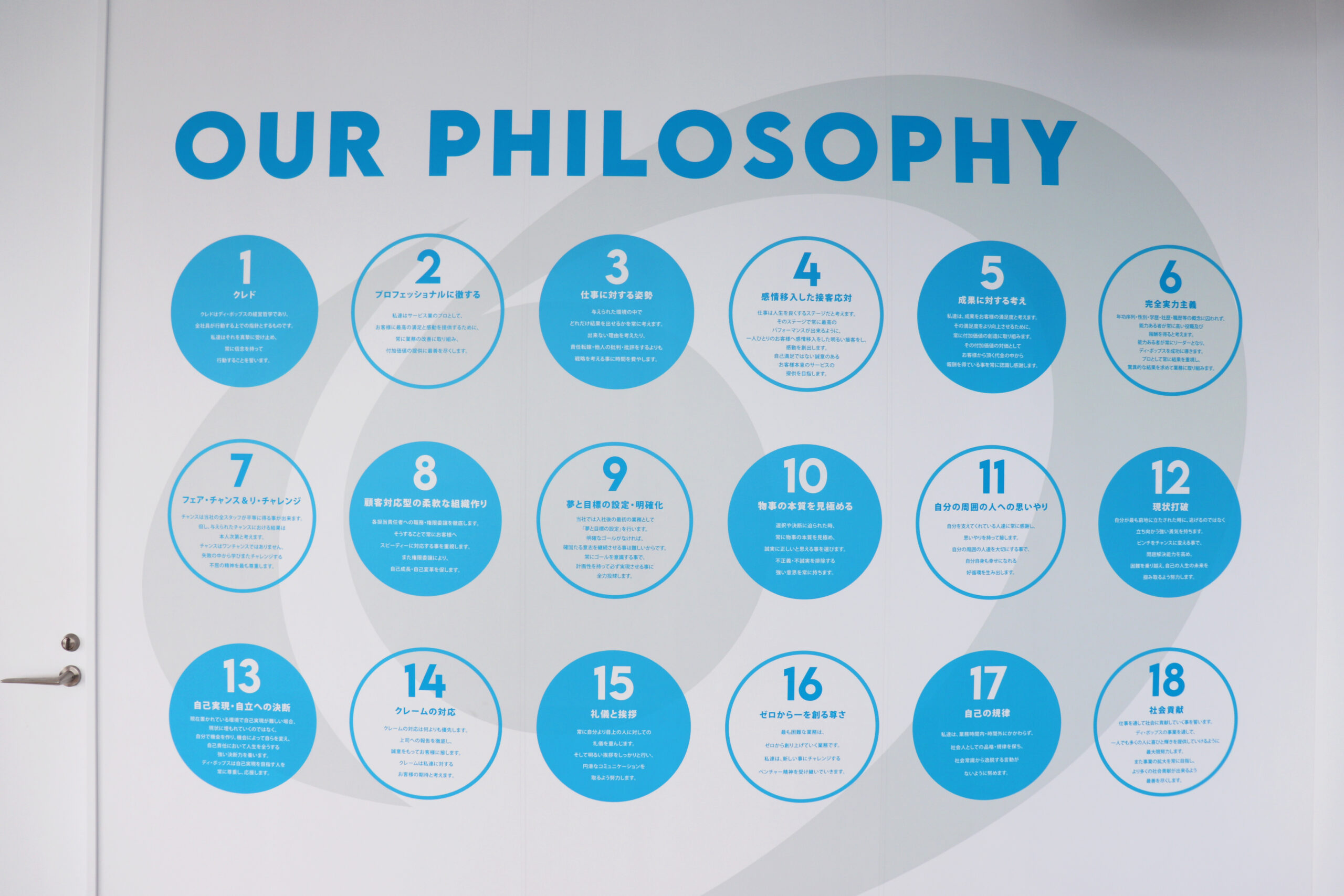
◆Thoughts Behind the Updated Logo
Sugihara:
Could you tell us about the thoughts behind the revamped website and the new logo?
Masuda:
The idea behind the new logo design is our aspiration to be number one in whatever we do. Our corporate vision includes contributing to our customers, providing employees with a platform for self-realization where they can control their own lives, generating profit, and continuously contributing to society. With that in mind, there’s a strong desire to be “number one” in our chosen business, even if it’s a niche market.
So, when you look at the logo, you’ll see a part that looks like the numeral 1 to represent “number one,” and another part that forms the letter D for D-POPS.
Our corporate colors are predominantly blue, including shades like sky blue. Blue often evokes feelings of brightness and freshness, doesn’t it? But it’s not just that; the logo also incorporates the idea of the passionate heart and composure of a blue flame into our corporate colors.
That blue 1 is actually supported by a smaller gray part. This signifies that in both life and organizations, it’s not just those on the front lines who achieve results; there are also those who are on the sidelines backing them up. Therefore, we aim to create an environment of mutual support. We, as a company, are committed to providing strong support, continuously expanding our capacity to do so. Within that framework, we strive to be number one, believing in the path we’ve chosen and the mission we must accomplish.
That’s the vision we poured into creating the new logo.
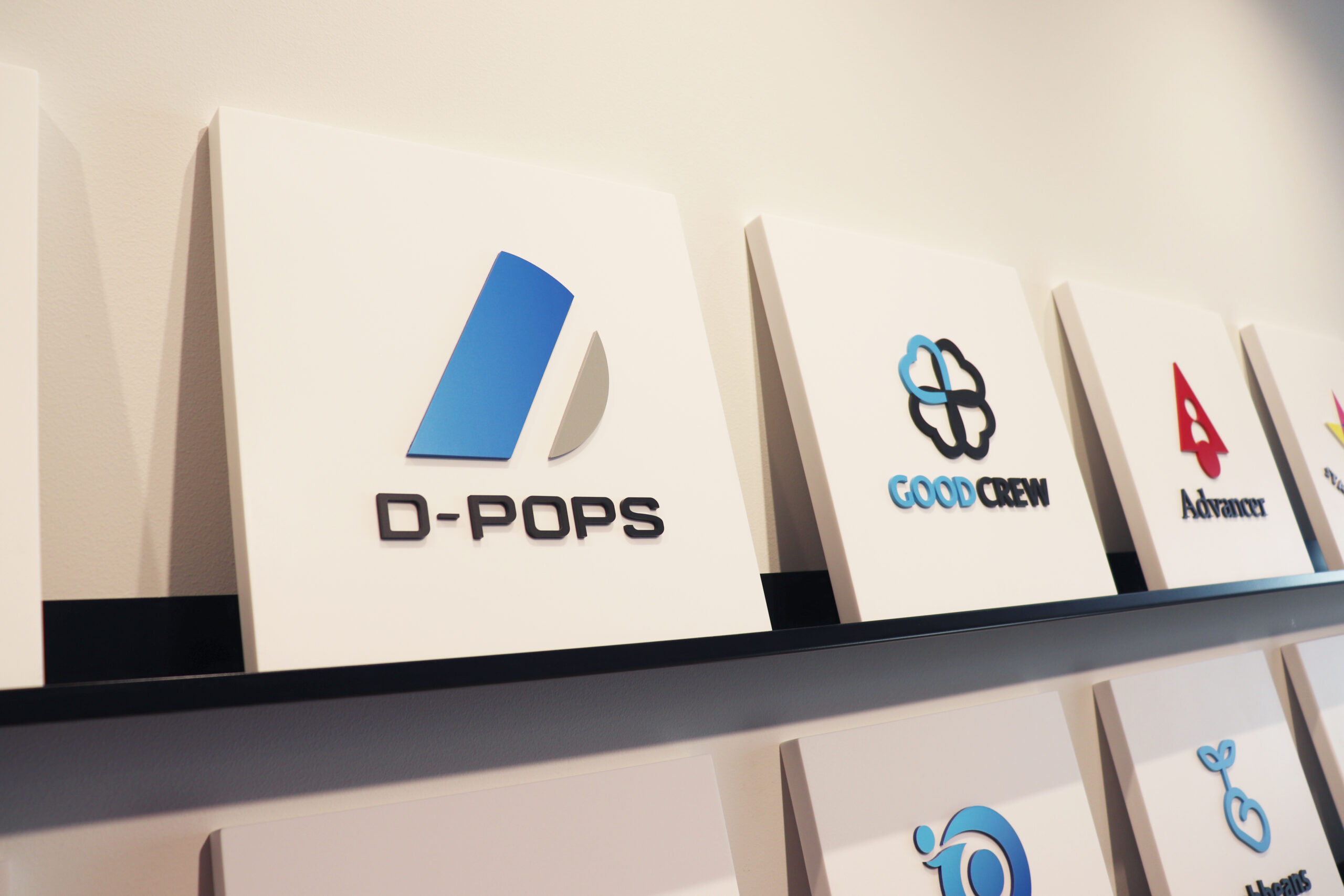
Interview conducted by D-POPS GROUP’s advisor Genta Sugihara.
D-POPS Corp.
Company President and CEO: Shoto Masuda
Address: Shibuya Hikarie Bldg. 32F, 2-21-1 Shibuya, Shibuya-ku, Tokyo
Established: February 1998
Website: https://d-pops.co.jp/
Next, in the latter part of the interview, we discuss:
・Strategies in the current market conditions
・TOP1’s sales and proactive policies
・About the new product, “OTHEBES”
・Our soccer-related activities
・“Realizing a Venture Ecosystem”
・And other topics
Be sure to check it out here:
https://d-pops-group.co.jp/en/column/dpops-interview-latter-part/




